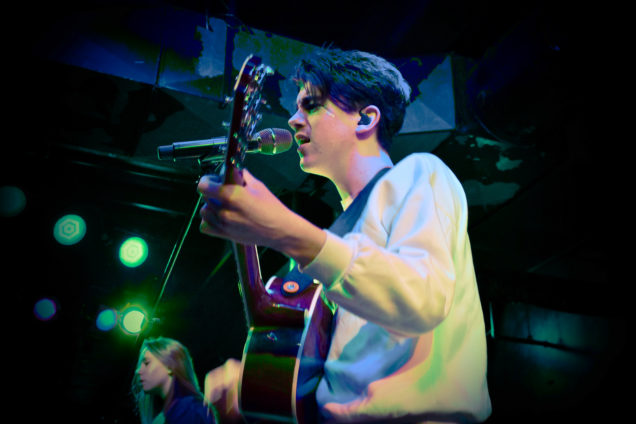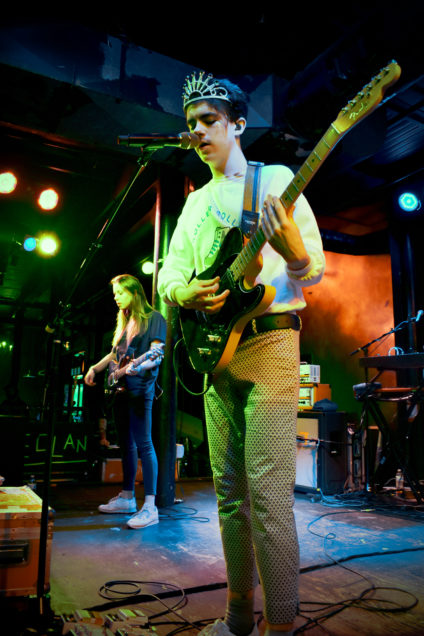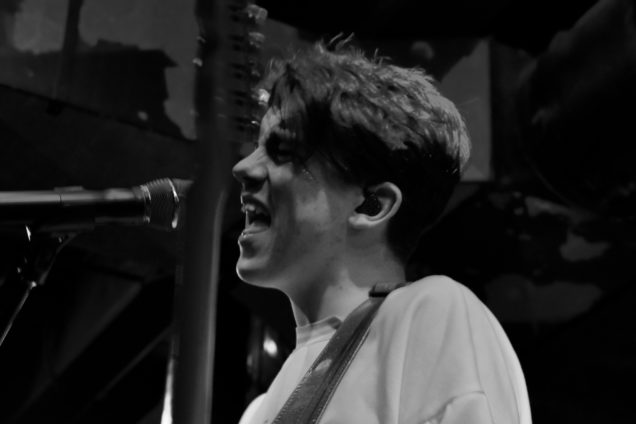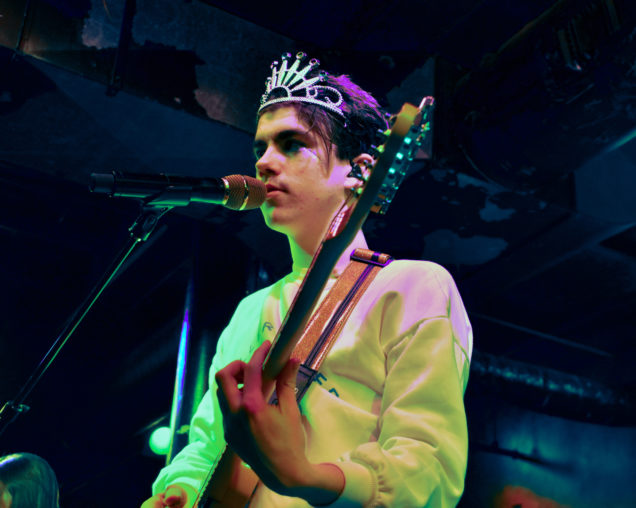INTERVIEW: Declan McKenna

On Feb. 22, WTBU DJ Monica Sucic sat down with Declan McKenna before his show at The Met in Pawtucket, R.I. Sucic talked Rostam, Bowie, and the pros and cons of social media with the English singer-songwriter.
Monica Sucic: What was it like working with Rostam?
Declan McKenna: Me and Rostam [formerly of Vampire Weekend] worked on the last song on the record. It was a fairly long, drawn out process. We were working in LA with me touring. We just started writing at the back end of the tour. I didn’t have anything written that I was planning on working with with him, but I just kind of started writing. I think it was the third out of three writing days that we started the idea for “Listen to Your Friends.” There were another couple of sessions where I went away and wrote some lyrics and came back and structured it a little bit more, then had another two or three day session with it. I went away again, came back, and then sort of finished it off. It was really fun working with him. He’s such a great songwriter, and it was a really cool experience doing that for the first time really. That tune ended up really cool, and obviously working with someone whose music I’ve been really into for a while was great. It was a very cool process, even though it was a bit awkward at first.
MS: Did you listen to a lot of Vampire Weekend growing up?
DM: I did. I listened to a lot of his stuff. I think that now he’s doing more of a production side. There’s a different side coming out since he’s working with different artists, which is cool.
MS: Who, living or dead, would your dream collaboration be with?
DM: If we’re going with dead, I would’ve loved to have worked with David Bowie. There’s a good David Bowie quote where he said, which is fairly true, “Most of the people I’ve worked with, I’ve made their best material” [laughs] or something along those lines. He worked with people like Iggy Pop, did stuff with Nile Rodgers, as well as being a great writer with his own [projects]. He was a great collaborator and great at bringing out the best in people. He had his fingers in so many pies over the ‘70s and ‘80s.
MS: Where do you draw most of your inspiration for writing?
DM: It depends. It could be conversational or it could be analysis, but a lot of it comes down to listening to loads of music. It’s kind of what inspires me. I just love listening to and absorbing lots of music of the artists I like, from ABBA to Nina Simone. I get inspired by listening to loads of music because it makes me excited to make music. Then obviously subject matter is a different story. I write about all sorts of different things, but I have a very open book when it comes to that, whether it’s writing about my own life, or writing about made-up character stories, or writing about observations of the wider world. All those sort of things come into one, really, and can all be a part of one song.
MS: Where’s your favorite place to write?
DM: Wherever I come up with a good idea is my favorite place to write. You can be as frustrated writing on the road as you can be in your bedroom. [laughs] My favorite time to write is probably late at night, I can say that for sure. I don’t know why. I think my brain’s a bit more weary and just has less intention to trail off and write all kinds of weird crap that doesn’t really need to be a part of the songwriting process. I tend to be focused on the core elements of the song late at night.
MS: I feel like that’s when everyone’s thoughts are just out.
DM: It is. I think that’s why it’s such a good songwriting time.
MS: You write about a lot of tense subjects. Do you ever feel that “I shouldn’t release this” or “I shouldn’t delve into this; it’s a touchy subject?” Or do you just go for it anyway?
DM: I see a lot of tweets from people that say “This is happening right now, you should write about it!” You don’t want to be like that. I don’t really see myself as a political artist, so I don’t want to just write about politics or my world view for the sake of it. There has to be a real purpose to it. If you’re going to touch on something that affects lots of people, you’ve got to think about the people. You can’t write about everything. When the moment comes, if you have the right idea and the right message and you can do something with it that’s appropriate and that works. People can write about anything. You can draw inspiration from anywhere; it’s how you do it. I often don’t have the right ideas about things, so I don’t do it. There’s a tendency for people to say “What are you gonna write about next? Are you gonna comment about this topical thing?” You can’t really be like that. You have to think of it happening when it happens and do something because you really, really care about something.
MS: Which song was the hardest to write? In terms of either lyrics or musically.
DM: I guess “Listen to Your Friends,” because the whole co-writing experience was quite a long, drawn-out thing. Solely just for struggling to release ideas to someone else, it was something that was quite difficult. The hardest song to finish was “Humongous.” It didn’t really structure properly until I was in the studio with James [Ford]. It eventually tied together. I made the end part first; that was a completely different thing. I was just on a train, really bored, and messing around with MIDI, but I didn’t know that would be a part of “Humongous.” I wrote the bulk of it at my house home alone for a couple of nights. I spent a little bit of time deciding what kind of verse I wanted to do and that was a bit confusing, but I wrote it fairly quickly after I figured out where I wanted to go with it. I was like “This end part is cool, and I think it should go on the end of this,” but it was getting them together [that was difficult], because there were about four or five different demos of me trying to stitch those two different parts together on my laptop and then none of them really resemble what it actually became once I sat down with James and he was like [waves hands around] “You’re going a bit too overboard with this, you can simplify it.” And then we stitched it all together and it was nice.
MS: If someone could only listen to one song off the album, which would you choose?
DM: “Humongous.” I think, even though it took so long to finish, it’s a great tune. I think it’s my favorite one off the record. If I was going to tell someone “This is what my music sounds like,” I would say that because I think it’s the best.
MS: How do you think social media affects our generation?
DM: It’s such a part of life. You see kids coming to shows, they’ll want to film it, they’ll want to post it on the socials. People want to document their daily lives, because it’s never really been that way before for everyday people. It’s an odd one. I like social media for some reasons, and I think in other ways it’s super toxic. I think people have certain insecurities that they may not have if it weren’t for social media. But at the same time I do think it has made certain people more conversational and more open. You look at different circles online coming together, especially with Twitter; there are so many people from different worlds and different walks of life and different communities all talking to each other and learning. I think I’ve learned so much that I wouldn’t have even bothered to think about if it hadn’t been for social media.
MS: There’s pros and cons.
DM: There’s definitely pros and cons. I do think there should be more focus on letting kids not get more insecure and focusing more on humanizing people on the Internet. People get perfect impressions of people. People have a perfect impression of me. There are tons of people, probably people outside that door, that think I’m literally perfect. They think their favorite singer is perfect, because they see nice pictures and they see nice tweets. It’s so easy to give that impression, because everyone posts the best pictures of them. It’s the same for everyone, but subconsciously you don’t really realize that.
MS: Do you ever feel overwhelmed by it?
DM: Of course, all the time.
MS: And do you have a constant feeling that you need to always be on social media?
DM: It’s such an automaton thing. Even if you know you’re not connected to the Internet or anything, sometimes you find yourself reaching for your phone. I’ve tried to do it less, and I’ve tried to tweet less, and I’ve tried to post less, because I realized that you get so caught up in it. You can just do really silly stuff that you don’t need to do. I try and use it less, but it is overwhelming. I kind of started realizing I was using my phone too much and all of it was work; all of it was part of my job. It’s quite intense. It’s fans or it’s journalists or it’s media outlets or my emails. It wasn’t actually social. It wasn’t me and my friends communicating. So I’ve tried to step away from that and tried to have more private and more social media presence outside of my actual work stuff, which I find is a lot less toxic for me.
MS: If you could get a tattoo for any song, artist, or album, what would it be?
DM [reveals a cup and a lightning bolt tattoo on his ankles]: “Brew” by Declan McKenna or David Bowie? [laughs]
MS: What’s the “Brew” one of? When did you get that?
DM: We were playing a gig in France at the Le Cabaret Vert Festival, and Ollie, who’s in a band called Feet, was playing in our band for a while because our bassist was out. His last gig with us was at this festival, and they were giving out free tattoos to the artists who were playing there. We saw one that was the cup from “Beauty and the Beast” and we didn’t really have time to get that done but then we thought “Brew,” and his favorite song to play live was “Brew.” Me, Ollie, Will, and Gabby all got cups.
MS: Was that your first one? Or the Bowie one.
DM: This one. [holds up his left ankle, showing his Bowie lightning bolt]
MS: When did you get that done?
DM: [laughs] When I was too young to get tattoos!
Declan McKenna’s first album, What Do You Think About the Car?, is out now and available on iTunes and Spotify. He is currently on tour across America with Chappell Roan.
[This interview was edited for length and clarity.]



